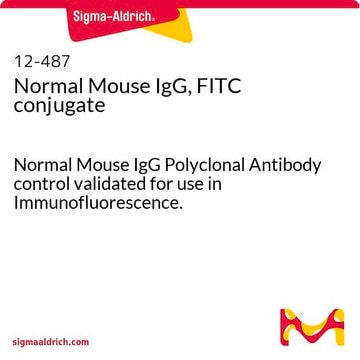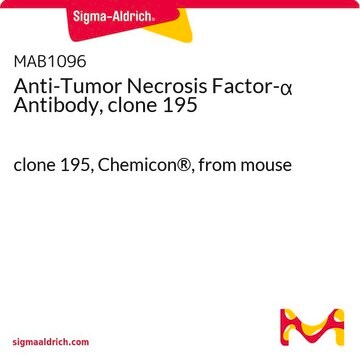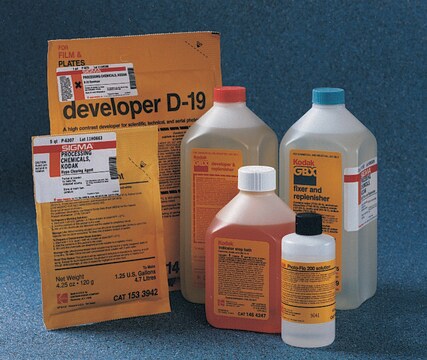MAB3061
Anti-Fas Antibody
CHEMICON®, mouse monoclonal, SM1/1
Synonyme(s) :
CD95, Apo-1
About This Item
Produits recommandés
product name
Anti-Fas Antibody, clone SM1/1, clone SM1/1, Chemicon®, from mouse
Source biologique
mouse
Niveau de qualité
Forme d'anticorps
purified immunoglobulin
Type de produit anticorps
primary antibodies
Clone
SM1/1, monoclonal
Espèces réactives
human
Fabricant/nom de marque
Chemicon®
Technique(s)
flow cytometry: suitable
Isotype
IgG2a
Numéro d'accès NCBI
Numéro d'accès UniProt
Conditions d'expédition
wet ice
Modification post-traductionnelle de la cible
unmodified
Informations sur le gène
human ... FAS(355)
Spécificité
Application
Induction of apoptosis with SM1/1:
SM1/1 induces apoptosis best when used together with a 10 molar excess of crosslinking anti-mouse IgG. The amount of antibody needed will vary depending upon the cell line used and the age of the cell and their growing conditions; best results are achieved when cells are less than 70% confluent and relatively young passage numbers, and note not all cells what express CD95 can be induced with SM1/1, the reasons why are unclear.
On Jurkat cells 100-500ng/mL of SM1/1 in the presence of 10X excess of goat anti-mouse IgG will produce ~50% kill as measured by MTT assay; without crosslinking, little or no killing will be observed.
On SKw6.4 cells 100-500ng/mL of SM1/1 in the presence of 10X excess goat anti-mouse IgG will produce ~50% kill as measured by MTT; without crosslinking ~20% or less of the cells will be induced.
On L/F15 cells 100-500ng/mL of SM1/1 with or without crosslinking IgG ~ 50% of the cells will be induced to undergo apoptosis as measured by MTT assay.
In all cases it is important to remove excess SM1/1 before adding the secondary crosslinking antibody;
Antibody additions can be either at 4C, or 37C; at 37C primary antibody should be incubated no longer than two hours prior to secondary crosslinker addition. Crosslinking antibody is typically incubated overnight, although shorter times may yield acceptable results.
As controls, cells should be incubated with an unrelated irrelevant isotype matched IgG2a antibody or with the crosslinking antibody alone.
SM1/1 monoclonal characterization is first reported in Trauth, BC et al Science 1989 245:301-5.
Optimal working dilutions must be determined by end user.
Apoptosis & Cancer
Apoptosis - Additional
Liaison
Forme physique
Stockage et stabilité
Autres remarques
Informations légales
Clause de non-responsabilité
Vous ne trouvez pas le bon produit ?
Essayez notre Outil de sélection de produits.
Code de la classe de stockage
12 - Non Combustible Liquids
Classe de danger pour l'eau (WGK)
WGK 2
Point d'éclair (°F)
Not applicable
Point d'éclair (°C)
Not applicable
Certificats d'analyse (COA)
Recherchez un Certificats d'analyse (COA) en saisissant le numéro de lot du produit. Les numéros de lot figurent sur l'étiquette du produit après les mots "Lot" ou "Batch".
Déjà en possession de ce produit ?
Retrouvez la documentation relative aux produits que vous avez récemment achetés dans la Bibliothèque de documents.
Notre équipe de scientifiques dispose d'une expérience dans tous les secteurs de la recherche, notamment en sciences de la vie, science des matériaux, synthèse chimique, chromatographie, analyse et dans de nombreux autres domaines..
Contacter notre Service technique







